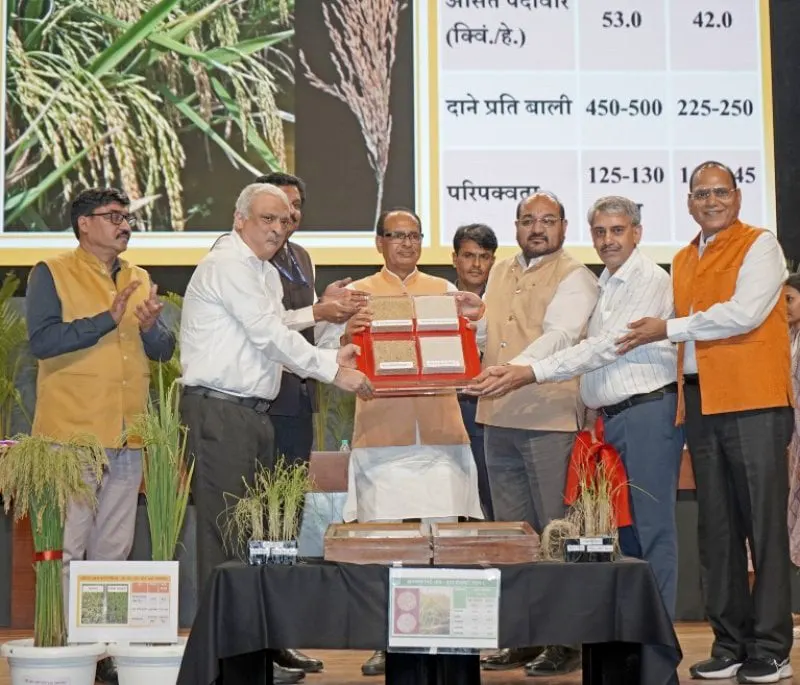India approves its first gene edited crop—rice that uses less water, reduces carbon emissions and increases yields
India approves its first gene edited crop—rice that uses less water, reduces carbon emissions and increases yields
Ankita Padney | Bioteknika | May 29, 2025
XLinkedInFacebookRedditBlueskyThreads


India has made a historic leap in Sustainable Farming by unveiling the world’s first Genome-Edited Rice varieties. “Pusa DST Rice 1” and “DRR Dhan 100 (Kamala).” These incredible rice varieties were developed by the ICAR (Indian Council of Agricultural Research). These advanced innovations have the power to revolutionize Rice cultivation, particularly in climate-vulnerable as well as water-stressed regions.
Follow the latest news and policy debates on sustainable agriculture, biomedicine, and other ‘disruptive’ innovations. Subscribe to our newsletter.
These novel rice varieties were developed to address three major climate challenges: water utilization, Environmental impact, as well as Rice productivity.
Scientists claim that these Rice varieties promise an enhanced yield of 20–30%. They also stated that due to these varieties, there would be a reduction in Methane (Greenhouse gas) emissions by nearly up to 20%.
…
Despite the Scientific support, opposition groups like the “Coalition for a GM-Free India” have raised their concerns regarding these Rice varieties. They have demanded the withdrawal of these two Genome-Edited Rice varieties, citing potential risks to human health, seed sovereignty, and ecological balance.
This is an excerpt. Read the original post here
XLinkedInFacebookRedditBlueskyThreads

 | Videos | More... |

Video: Nuclear energy will destroy us? Global warming is an existential threat? Chemicals are massacring bees? Donate to the Green Industrial Complex!
 | Bees & Pollinators | More... |

GLP podcast: Science journalism is a mess. Here’s how to fix it

Mosquito massacre: Can we safely tackle malaria with a CRISPR gene drive?

Are we facing an ‘Insect Apocalypse’ caused by ‘intensive, industrial’ farming and agricultural chemicals? The media say yes; Science says ‘no’
 | Infographics | More... |

Infographic: Global regulatory and health research agencies on whether glyphosate causes cancer
Does glyphosate—the world's most heavily-used herbicide—pose serious harm to humans? Is it carcinogenic? Those issues are of both legal and ...
 | GMO FAQs | More... |

Why is there controversy over GMO foods but not GMO drugs?
Genetic Literacy Project

How are GMOs labeled around the world?
Genetic Literacy Project

How does genetic engineering differ from conventional breeding?
Genetic Literacy Project
 | GLP Profiles | More... |

Alex Jones: Right-wing conspiracy theorist stokes fear of GMOs, pesticides to sell ‘health supplements’




 A single high dose of LSD can ease anxiety and depression for months
A single high dose of LSD can ease anxiety and depression for months CRISPR pork: U.S. approves first gene-edited pigs for consumption
CRISPR pork: U.S. approves first gene-edited pigs for consumption From plastic coasters to human hearts: Inside the race to print the human body
From plastic coasters to human hearts: Inside the race to print the human body ‘SuperAgers’: Why some people have the brains and memory capacity of people decades younger
‘SuperAgers’: Why some people have the brains and memory capacity of people decades younger  Baby food panic, brought to you by trial lawyers hoping to prosecute by press release
Baby food panic, brought to you by trial lawyers hoping to prosecute by press release Viewpoint: Life and death decisions: RFK, Jr.’s shady FDA “expert panels” operate in secret with no transcripts or conflict of interest reviews
Viewpoint: Life and death decisions: RFK, Jr.’s shady FDA “expert panels” operate in secret with no transcripts or conflict of interest reviews From ‘Frankenfood’ to superfood: Can the purple tomato overcome GMO myths to win over consumers?
From ‘Frankenfood’ to superfood: Can the purple tomato overcome GMO myths to win over consumers? When farmers deny science: The hypocrisy hurting agriculture’s credibility
When farmers deny science: The hypocrisy hurting agriculture’s credibility
